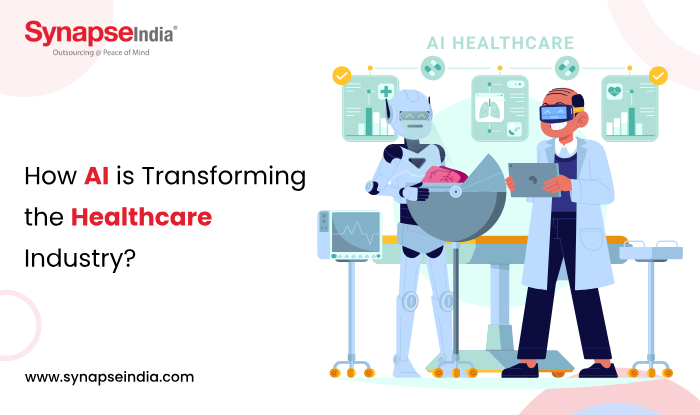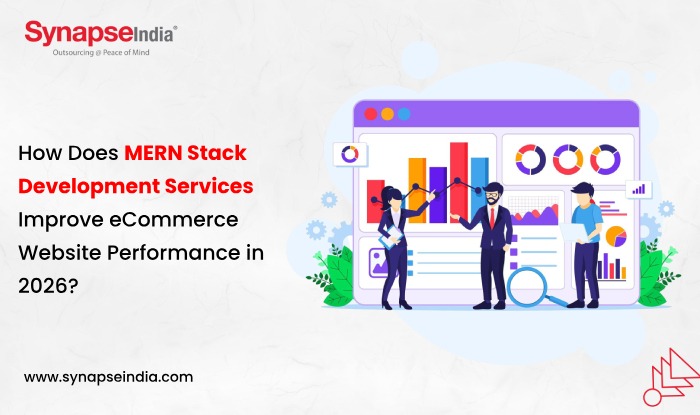 18 Mar 2024
18 Mar 2024
AI offers great possibilities to every sector of business, in the same way, we have seen new possibilities in the use of AI in the healthcare sector have undergone a revolution. These opportunities encompass patient care, optimizing processes, and fostering creativity. AI technologies are revolutionizing AI in Healthcare delivery in all its forms, from customized medicine to predictive analytics, opening the door to more effective, accurate, and easily accessible services. Medical AI practitioners can gain important insights, enhance the precision of their diagnoses, and improve treatment regimens by using data, algorithms, and machine learning approaches. AI in the Healthcare industry in this age of digital transformation enables experts to save lives, save costs, and provide better results. In this blog, we will explore some amazing and lesser-known facts on how AI has transformed the healthcare industry.

Artificial intelligence (AI) has changed the healthcare sector by bringing top approaches to complex issues and propelling previously unheard-of improvements in patient care. AI technologies are changing every aspect of healthcare delivery, from improving diagnosis accuracy and treatment efficacy to expediting administrative duties. AI-powered systems can quickly and accurately evaluate large volumes of medical data, which helps use of AI in healthcare providers make better decisions and provide individualized care based on each patient's needs. Predictive analytics powered by AI can also assist detect early illness indicators, enhance treatment plans, and enhance patient outcomes. Medical AI businesses can use AI to improve the quality and accessibility of AI in Healthcare services for patients worldwide, as well as to streamline operations and cut costs.
There are few major use cases of AI in the healthcare industry
Artificial intelligence (AI) systems can evaluate medical pictures, including MRIs, CT scans, and X-rays, to help radiologists diagnose illnesses more quickly and precisely by looking for anomalies.
Through the analysis of massive datasets, AI-powered algorithms can expedite the drug discovery process by identifying promising drug candidates, estimating their efficacy, and optimizing drug design, ultimately resulting in more rapid and economical drug development.
Artificial intelligence (AI)-enabled chatbots and virtual assistants can improve patient engagement and access to care by giving patients personalized use of AI in healthcare information, scheduling appointments, answering questions about health, and providing remote monitoring and assistance.
By analyzing patient data, AI-driven algorithms may create individualized treatment regimens that are specific to each patient's medical history, genetic makeup, and lifestyle choices. This improves treatment outcomes and increases patient satisfaction.
Medical AI personnel can remotely follow patients' health states, identify early warning signals of deterioration, and take fast action to prevent complications by using wearable gadgets and sensors enabled by artificial intelligence (AI).

Every industry has undergone a lot of changes over a few years. In the same way, we have seen a major transformation in the healthcare industry as well. With the introduction of AI and ML, the industry has brought a major shift to AI in the healthcaresector.
Medical imaging data, including X-rays, MRIs, and CT scans, can be analyzed by AI-powered algorithms to help radiologists diagnose illnesses more quickly and correctly by identifying anomalies. AI-driven diagnostic systems can also examine patient data to spot trends and forecast the course of diseases, allowing for early diagnosis and individualized treatment regimens.
Artificial intelligence (AI) technology makes it possible for the use of AI in healthcare professionals to remotely monitor patients' health states, give them individualized healthcare interventions, and consult with them in real-time through virtual health assistants. This improves patient outcomes, lowers the rate of readmissions to hospitals, and enables proactive healthcare management.
AI-driven algorithms speed up the drug discovery process by evaluating enormous volumes of biomedical data, such as genetic information, molecular structures, and clinical trial data. Pharmaceutical companies may now more quickly identify possible medication candidates, forecast therapeutic efficacy, and optimize drug design, which speeds up and lowers the cost of drug development.
AI systems examine patient data to determine who is at high risk, forecast when a disease may manifest, and suggest measures to lower the frequency of illness and associated medical expenses. The use of AI in healthcare companies can improve population health and avoid chronic diseases by implementing preventive tactics, focusing interventions, and prioritizing resources by utilizing predictive analytics.
AI technology makes it possible to create individualized treatment programs that are specific to the genetic make-up, medical background, lifestyle, and reaction to therapy of each patient. By providing individualized therapies that cater to each patient's requirements and preferences, precision medicine improves treatment outcomes, reduces side effects, and raises patient satisfaction.
AI has a revolutionary impact on the medical AI sector. We have witnessed how Artificial Intelligence has completely changed. In this way, the use of AI in healthcare is delivered and managed, by improving treatment efficacy and diagnostic accuracy. Apart from this, we have also seen a major transformation in drug discovery and personalized medicine. AI in Healthcare companies may enhance patient outcomes, maximize resource efficiency, and promote medical innovation and research by leveraging AI-driven technology. To guarantee responsible and equitable AI deployment in healthcare, it is crucial to address ethical, legal, and privacy concerns as AI develops. However, AI-driven healthcare is the way of the future, offering everyone a more effective, accessible, and patient-centered healthcare system.

 02 Aug 2024
02 Aug 2024
